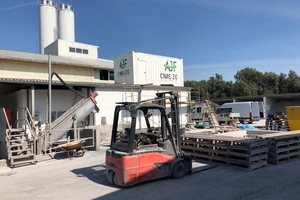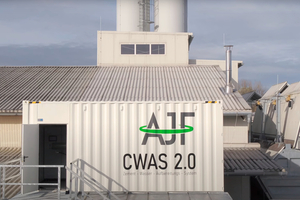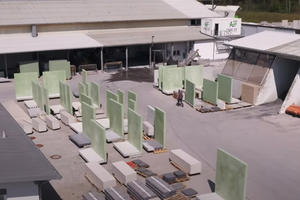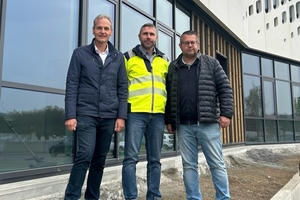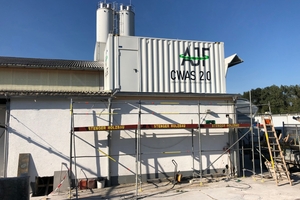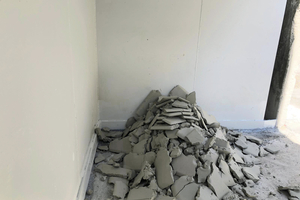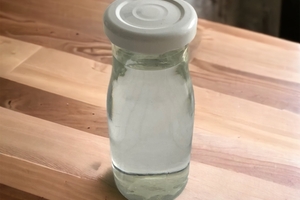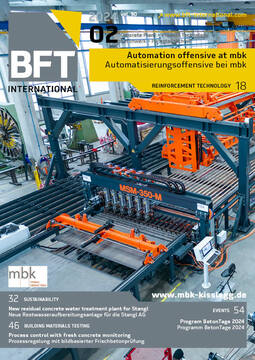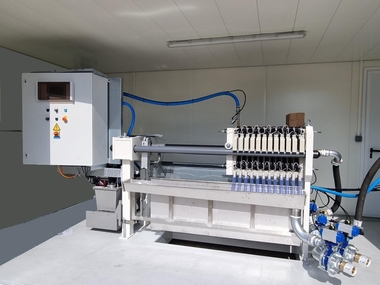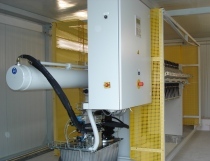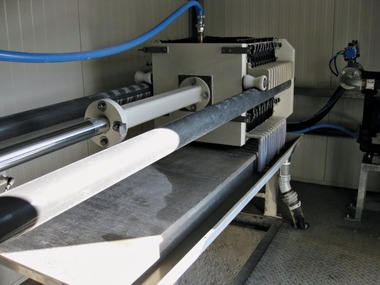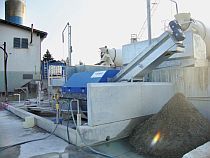New residual concrete water treatment plant for water from cleaning and recycling processes for Stangl AG
The company Stangl AG recently received a new AJF residual water treatment plant consisting of a filter press, a CrVII splitting function, a pH neutralization system and a sand filter. The customer had requested that the water used for cleaning was to be the water recovered from the cleaning and recycling processes for excess concrete and concrete buckets.
The requirements imposed on concrete producers for reducing environmental impact and controlling low-emission production processes are continuously becoming more stringent. One of the especially critical issues is here the question concerning the treatment of concrete process water, since legal stipulations increasingly restrict the use of fresh water and stipulate the reutilization of residual concrete process water. This especially impacts operations in large cities and urban centers. There, the residual concrete and cement water arising from rinsing company vehicles every evening are posing manufacturers considerable problems, especially in congested urban and inner-city areas. This wastewater can be heavily contaminated with environmentally harmful chromium CrVI and may not be directly discharged into the ground at the construction site. Further usage and/or addition to the production process is nearly impossible. The only solution here remains cost-intensive disposal – if a disposal company or dump can be found or prepared to accept the residual water and/or sludge.
The company Schwenk, one of the major concrete producers in Germany, was faced with this problem. As a result, the company decided to provide one of its largest plants on Rhinstrasse in Berlin with an advanced water-treatment plant. Following intensive canvassing of the market, the company decided on the CWAS plant from AJF, which, according to the manufacturer, is setting new standards in the area of treatment of residual concrete water.
Minimal time and effort for erection and installation
The engineering process is housed in an insulated 20-foot container and therefore suitable for use in winter. The entire plant is delivered completely pre-assembled and tested, thus reducing time and effort required for erection and installation to a minimum. In times of continuously rising costs for disposal and water, the solutions from AJF, moreover, contribute to cost reduction for the customer. Complex handling around the residual water basin with cyclone units, sludge and settling basins and other polluted solutions are therefore completely eliminated.
“We want to support concrete producers in reduction of CO2 and in achieving eco-balance, and in helping to save raw materials and/or aggregates for concrete. For this reason, we recover only as much solid matter from the residual water as necessary for complying with DIN specifications,” explains Bernd Hahn, Managing Director of the AJF Group. “In this context, the use of our system is as easy as possible, and amortization, depending on the region, within between four to five years is realistic.”
Impressive reference list of satisfied customers
The reference list of satisfied AJF customers from the concrete sector is impressive. These include the above-stated company Schwenk, as well as Dyckerhoff, Zimmermann Beton, Strabag, Fdu, Rekers, Mischek, Berding Beton, Havelbeton, Lujabetoni of Finland, Märker, Betonwerk Pfullendorf, BBL, Hentschke, Wopfinger and Stangl AG.
The last-mentioned company, Stangl AG, headquartered in Waldkraiburg in Bavaria – manufacturer of customized concrete components, with more than 60 years of experience and a staff of around 60 – recently installed a new AJF residual water treatment plant. The customer had requested conditioning of the water from the cleaning and recycling process of excess concrete and concrete buckets, since this water could no longer be used in production.
The capacity of the plant – consisting of a filter press, the CrVII splitting unit, a pH neutralization system and a sand filter – was planned to be 5 m³/h, with a production time of 10 hours and a five-day workweek. Specifications called for reduction of the following: CrVi content in the water, the pH value from 13 to 9 and the amount of suspended particles (sand and cement) in the water: i.e., reduction of the suspended-particle content from 100 g/l to less than 10 mg/l, and drainage of the concrete sludge.
Successful installation of the plant
“Despite and/or precisely because of the stricter requirements from authorities, and our own claim on sustainability, construction time was only approx. six months,” explained Dipl.-Ing. (FH) Hubert Anglhuber, Technical Plant Manager at Stangl AG. “The automatic plant starts in the early morning, around 03:00 am, and operates independently, without personnel, except for daily cleaning of the filter press. The consumption of electric energy ranges at around 16 kW.”
The first step was installation of a chamber filter press in the insulated maritime container. The installation was carried out completely in the AJF plant and was delivered ready to plug in. CrVI reduction took place at a special dosing station by stirring in a suspension into the residual water. pH neutralization was effected by addition of CO2. For this purpose, AJF has developed a special dosing unit to save CO2 and thereby to lower running costs. A fully automatic sand filter plant was installed downstream to enable compliance with the requirement of a reduced amount of suspended matter in the water. This plant removes the final and minutest suspended particles from the water. In addition, an active coal filter was installed at Stangl to finally remove all pollutants from the water.
Every AJF development for comprehensive, innovative concrete recycling offers made-to-measure computer-controlled density measurement and pH-neutralization. Filter presses for processing concrete sludge also play a major role in sustainable construction material recycling. Coarse matter is separated in advance, since only fine particles up to 0.2 mm may be processed. Sludge, which the chamber press ejects as solid filter cake, is subsequently used as rubble in road and path construction.
CONTACT
AJF-Group Engineering GmbH
Inneberg 17
87743 Egg an der Günz/Germany
+49 8333 94617-77

